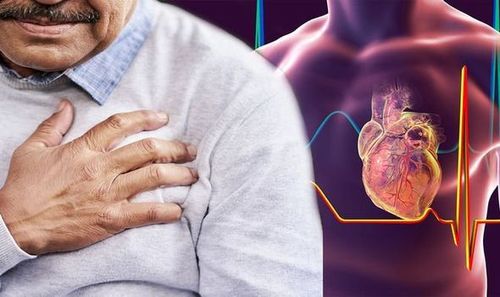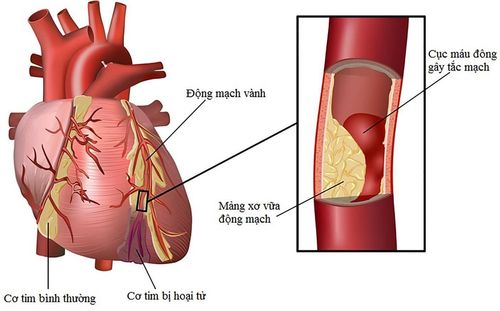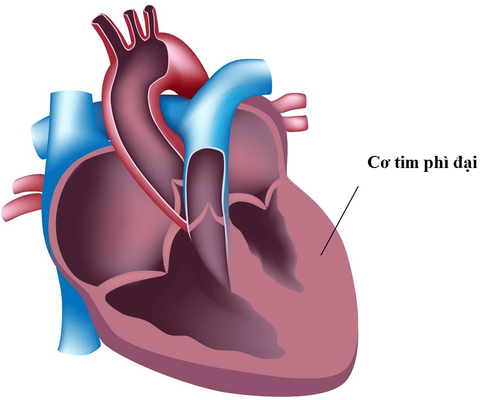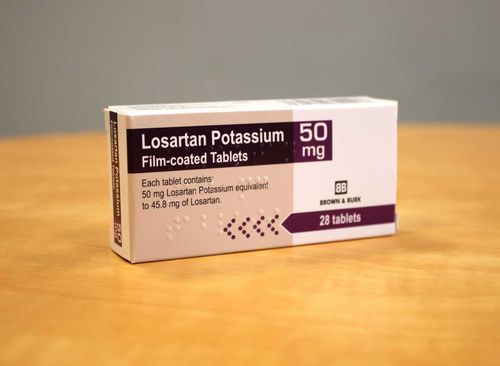This is an automatically translated article.
The article was professionally consulted by a Doctor of Cardiology - Thoracic Surgery, Vinmec Central Park International General Hospital.Hypertrophic cardiomyopathy is a condition in which the left ventricle or the entire heart muscle, the right ventricle, and the apex of the heart are enlarged, abnormally thick. Hypertrophic cardiomyopathy is an inherited disease with an incidence of 1/500.
1. What is hypertrophic cardiomyopathy?
Hypertrophic cardiomyopathy is a heart muscle disorder that reduces the ability of the heart to contract and circulate blood, affecting the heart rhythm, causing arrhythmias. In hypertrophic cardiomyopathy, the abnormal growth of heart muscle fibers causes the wall of the heart to thicken, especially in the main pumping chamber (left ventricle), the inner chamber of the left ventricle shrinks, and the heart cannot expand. Between beats causes the ventricles to pump less blood out of the heart. Mechanism of disease causes patients to have angina pectoris, shortness of breath, which can lead to sudden death.Hypertrophic cardiomyopathy is an inherited disease caused by genetic mutations, there are currently 13 genes with more than 900 mutations that can cause hypertrophic cardiomyopathy. Approximately 60% of patients are diagnosed with the disease due to mutations in genes encoding the proteins of the myocardial sarcomere structure and 40% due to mutations in other genes or of unknown cause.
Hypertrophic cardiomyopathy is rare in children. Cases of hypertrophic cardiomyopathy in children often have no known cause.
2. Manifestations of hypertrophic cardiomyopathy
The main subjects of hypertrophic cardiomyopathy are young adults or athletes. This is a particularly dangerous disease because often there are no obvious symptoms, patients can live a normal life, but the first and last symptom of the disease is sudden death.Some symptoms of the disease are easily confused with other diseases such as: angina pectoris, dizziness, lightheadedness, dizziness when changing positions suddenly or vigorously exercising, shortness of breath, or fatigue, fainting .
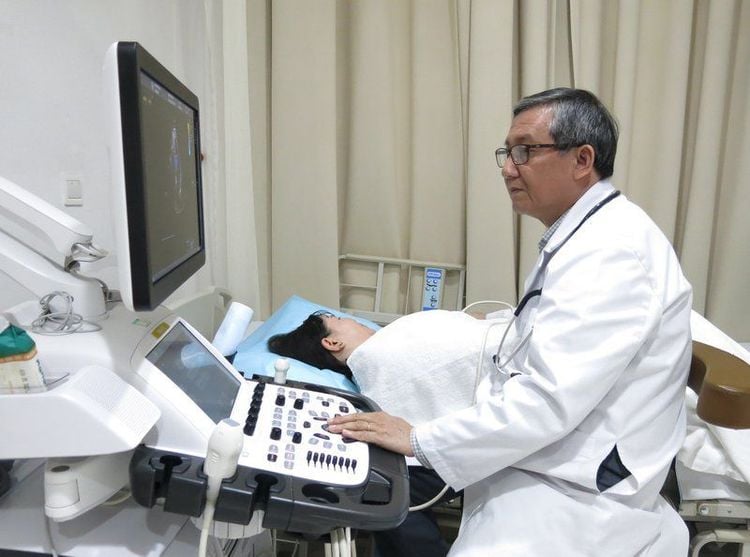
Siêu âm tim là một trong những bước sàng lọc và chẩn đoán bệnh cơ tim phì đại
Cardiac examination to detect abnormal sounds or murmurs in the heart. Echocardiography, electrocardiogram, X-ray, cardiac catheterization to measure blood pressure in the heart chambers. In some advanced countries, patients and their family members will be tested for gene mutations that cause disease.
3. Causes of hypertrophic cardiomyopathy
Hypertrophic cardiomyopathy is an inherited disease, caused by genetic mutations that cause the heart wall to thicken, affecting the function of the heart muscle. Once diagnosed, the rest of the family should also be tested for a timely diagnosis. In addition, there are some other causes of hypertrophic cardiomyopathy including:Secondary to systolic overload:
Abnormal sub-mitral valve apparatus. Aortic stenosis Coarctation of the aorta Transient hypertension Hypertrophic cardiomyopathy in neonates of diabetic mothers. Corticosteroids in infants. Multiple organs with myocardial hypertrophy:
Noonan syndrome Friedreich's disease Glycogen metabolic disease Deficiency in mitochondrial oxidation chains Abnormalities in fatty acid oxidation. Simple form: Idiopathic, family
4. Treatment of hypertrophic cardiomyopathy
The treatment of hypertrophic cardiomyopathy is mainly symptomatic treatment aimed at alleviating the symptoms and complications of the disease through medication and lifestyle changes.Drug therapy:
Beta-blockers to reduce heart rate and preserve myocardium; Calcium channel blockers to prolong diastole and increase contractility; antiarrhythmic drugs. Lifestyle changes:
Limit exertion and participate in high-intensity sports such as running, football, basketball... Follow up and follow up with your doctor on schedule to know health status of the patient. Take medicine and diet according to the advice of the treating doctor. Surgery:
In case the patient does not respond to the treatment of hypertrophic cardiomyopathy with drugs, the patient will have to apply treatment with surgery or ablation of the myocardium with pure alcohol.
Myocardiectomy: The doctor will remove the enlarged part of the interventricular septum to free up the left ventricular outflow tract. At the same time, surgery can repair pathological heart valves for patients. 90% of patients with hypertrophic cardiomyopathy improve their condition and lead normal lives more than 30 years later. In some cases, the conduction system of the heart is affected, the patient will have to have a permanent pacemaker attached. Myocardial ablation with pure alcohol: The method of ablation of the myocardium with pure alcohol is to bring the catheter through the artery to the coronary artery, supplying blood to the enlarged part of the heart muscle. After determining the appropriate branch of the artery, the doctor will inject 3-4ml of pure alcohol, causing that branch of the artery to become blocked and unable to supply blood to the enlarged heart muscle, helping the enlarged part to collect blood. shrink after 8-12 weeks. This is a new method, effective in 70-80% of patients, effective time less than 5 years.

Sử dụng máy khử rung tim để theo dõi nhịp tim và giúp nhịp tim trở lại bình thường khi có dấu hiệu bất thường
4. How to prevent hypertrophic cardiomyopathy?
Hypertrophic cardiomyopathy is an inherited disease caused by genetic mutations, so there is no effective method of prevention. Currently, there is no medical test to diagnose the risk of genetic mutations before pregnancy. The most effective method to prevent complications of the disease is to detect the disease at an early stage, preventing the disease from getting worse.Cases at high risk of sudden death due to arrhythmia can be fitted with a defibrillator to treat arrhythmias in case of need. A defibrillator is a small device that is attached under the skin to the patient's chest and has electrodes that lead to the right ventricle or atrium. The machine can monitor the heart rate and deliver electric shocks when it detects an abnormal heart rhythm, helping the heart rate to return to normal.
In case a family member has hypertrophic cardiomyopathy, the remaining members should go for regular health check-ups so that the disease can be detected early and have effective treatment methods.
Please dial HOTLINE for more information or register for an appointment HERE. Download MyVinmec app to make appointments faster and to manage your bookings easily.




